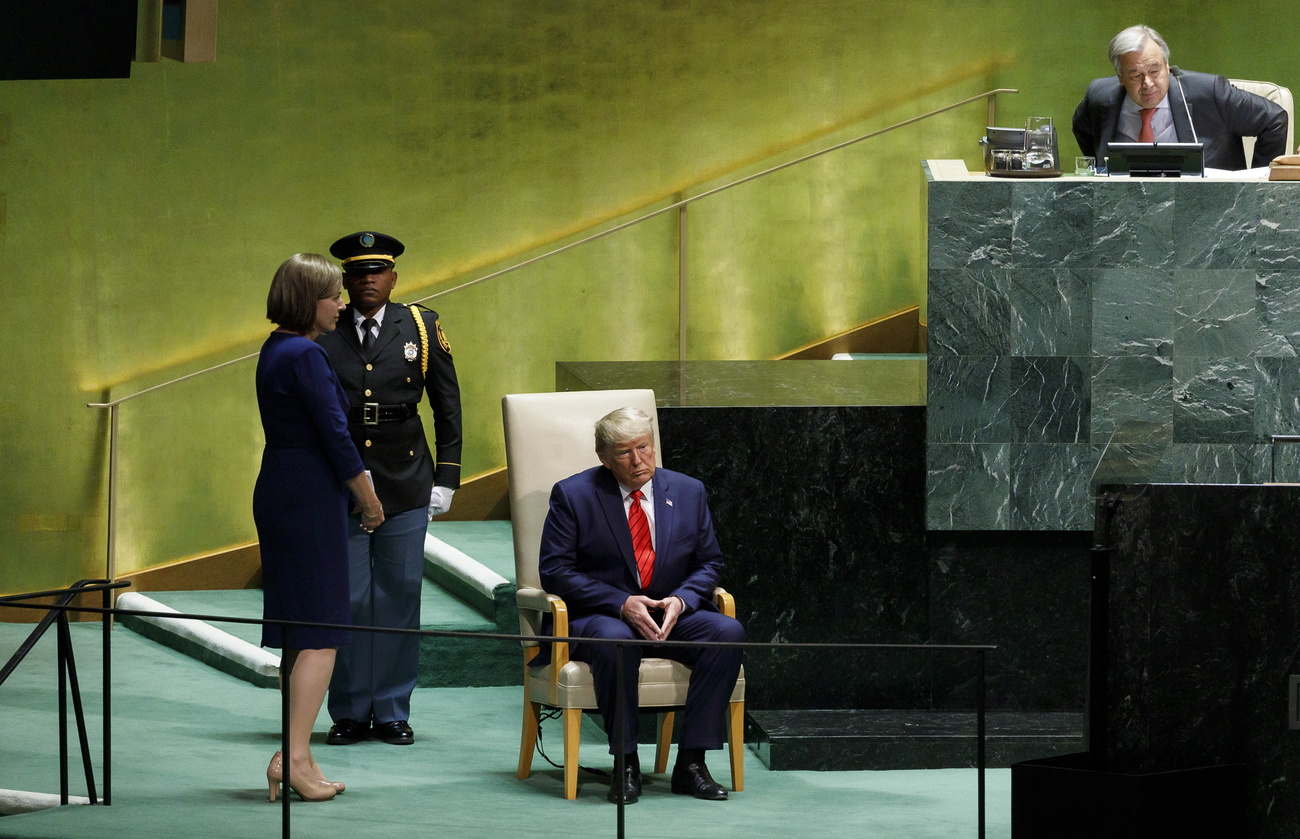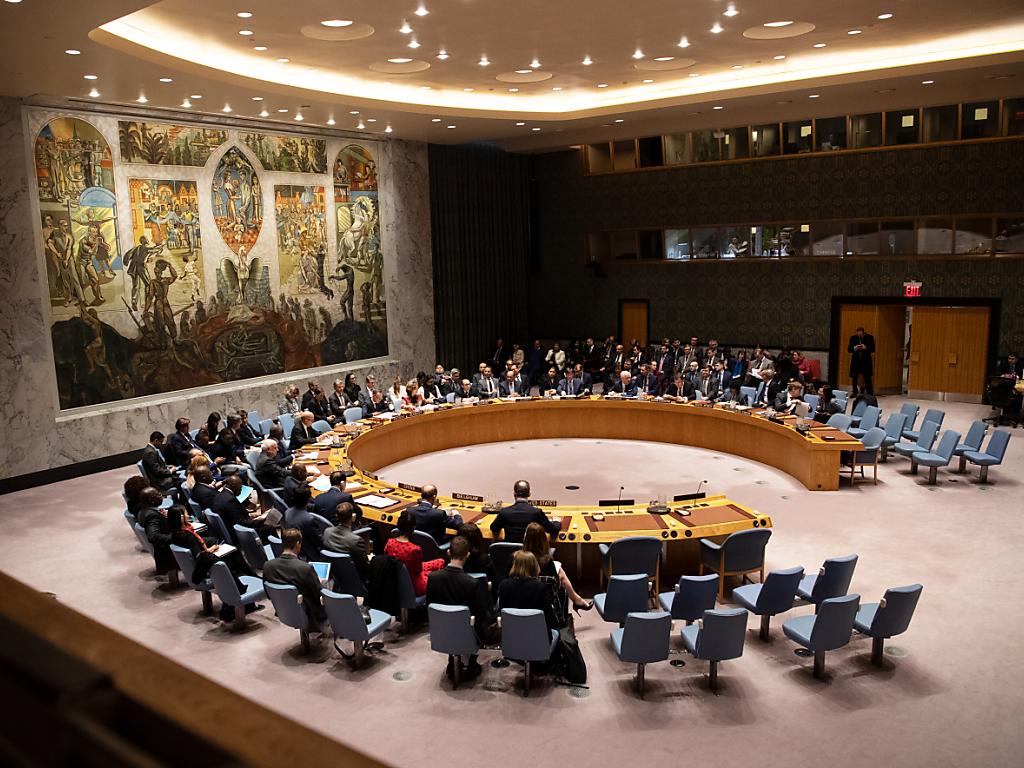
2024: UN correspondents look back
2024 is almost at an end, which means it’s time for our Inside Geneva podcast to look back at the year. We’re joined on this episode by Dorian Burkhalter, Geneva correspondent with SWI swissinfo.ch, Dawn Clancy, UN correspondent in New York, and Nick Cumming-Bruce, contributor to the New York Times here in Geneva.
So what has stood out in 2024? Depressingly, Dorian reminds us that this time last year, we were talking about wars in the Middle East, Ukraine and Sudan – and none of them have gone away.
“Wars everywhere” he tells Inside Geneva. “Climate change, deepening inequalities… it’s just threats everywhere. But it just seems like the more global our problems are becoming, the weaker the UN is also becoming.”
That’s why for him, the stand-out moment for 2024 is the election of Donald Trump as US president, and what threat that might pose for the UN, and the multilateral system.
Nick Cumming-Bruce agrees that, just weeks after Trump’s election, followed by a spate of eye-catching, often controversial appointments to the presidential team, “it’s hard to top the US election because it’s already dominating the conversation on everything else that we’ve covered in 2024″.

More
US election: is America drifting away from International Geneva?
Failing UN or failing international cooperation?
It can be complicated, sometimes, to analyse why the world is so unstable right now, and why it seems so difficult to resolve conflicts. Some blame the lingering inequality caused by the 2008 financial crash, or the shock of the Covid 19 pandemic, or migration, or terrorist attacks.
Others point to unscrupulous politicians who offer simplistic, populist solutions to complex problems. Does a “my country first” politician succeed because multilateralism, or the United Nations, are failing? Or does the UN fail because isolationist leaders see it as a nuisance, and actively want it out of the way?
Dawn Clancy provides a telling image from the UN in New York, which, she says, stood out for her as emblematic of 2024. “It has to do with the Israeli ambassador,” she recalls. “He was giving a speech in the UN General Assembly, and he brought with him a mini shredder and he began to shred pages of the UN Charter.”
Ambassador Gilad Erdan, who has since been replaced by Ambassador Danny Danon, used this stunt to object to UN concerns about the conduct of the war in Gaza, and to accuse the UN of antisemitism, a claim senior UN diplomats strenuously object to.
For Dawn, the act was telling; a visual reminder that many government leaders are only interested in the UN when it backs their own policy. “I just thought, wow, here’s a member state, standing in front of the General Assembly, and he’s actually shredding pages of the charter, yeah, I thought, that pretty much sums up the year.”
+ Listen and subscribe to the latest episodes of Inside Geneva here
End of the ‘rules based order’?
That powerful image, of the UN charter being shredded on the floor of the United Nations itself encapsulates what I sense about 2024, and where I think it differs from 2023.
In previous years we have seen blatant flouting of international law, we have seen terrible human rights violations, in Myanmar or Syria, for example. But in 2024 we have seen the world’s biggest powers openly criticising, ridiculing and ignoring the fundamental ‘rules based order’ which they pushed for and agreed to after the Second World War.
Within the UN Security Council, the all powerful veto-wielding permanent five members now include an indicted war criminal (Russia’s Vladimir Putin), a country that has been the subject of a detailed UN report suggesting crimes against humanity (China, over its treatment of the Uyghur community), and the United States, whose president-elect Donald Trump has suggested “torture works”, and whose current president, Joe Biden, continues to approve massive arms shipments to Israel, and calls the International Criminal Court’s indictment of Israeli Prime Minister Benjamin Netanyahu “outrageous”.
How can international law survive in these circumstances? What’s more, how can the rest of the world even trust the rules-based order when the most powerful nations on earth, the ones who can do most to influence – or stymie – solutions to global problems, seem so intent on furthering only their own self-interest?

More
The UN Security Council is failing – this is why
No leadership on global challenges
Another stark image from 2024 was the small island states walking out at the COP29 climate summit in Baku, Azerbaijan. Once again, they felt that their existential concerns about climate change were being ignored and the world’s biggest emitters of greenhouse gases (the US, China and Russia) were not offering the serious commitment needed to tackle it.

More
International Geneva
Then there are the complicated and much-delayed negotiations over a pandemic treaty. Again, big powerful countries are raising objections. And from January the US could well pull out of both the Paris Climate Agreement, the World Health Organization (WHO), and the UN Human Rights Council.
No wonder the UN in Geneva has felt a collective chill. After all, as Dawn Clancy points out in the podcast, the incoming Trump administration is “threatening to cut funding, the US is the biggest funder of the UN, billions of dollars. So it’s just going to be chaos and no leadership”.
Ending 2024, I can’t escape the feeling that our world is shifting, that we may now be entering a new world order, without the guardrails of international law, or the Geneva Conventions. Are we now so far from the horrors of the 1930s and 40s that we are doomed to make the same mistakes again? I really hope not.
To hear our fascinating discussion – and find out why Dawn likens the P5 to Golum in the Lord of the Rings, Dorian’s positive scenarios Dorian for 2025 and Nick’s struggles to find any – listen to the latest episode of the Inside Geneva podcast.

In compliance with the JTI standards
More: SWI swissinfo.ch certified by the Journalism Trust Initiative
















![The four-metre-long painting "Sonntag der Bergbauern" [Sunday of the Mountain Farmers, 1923-24/26] had to be removed by a crane from the German Chancellery in Berlin for the exhibition in Bern.](https://www.swissinfo.ch/content/wp-content/uploads/sites/13/2025/12/01_Pressebild_KirchnerxKirchner.jpg?ver=a45b19f3)













You can find an overview of ongoing debates with our journalists here . Please join us!
If you want to start a conversation about a topic raised in this article or want to report factual errors, email us at english@swissinfo.ch.